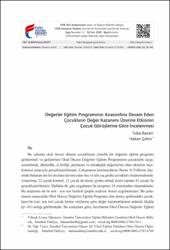Değerler Eğitim Programının Anasınıfına Devam Eden Çocukların Değer Kazanımı Üzerine Etkisinin Çocuk Görüşlerine Göre İncelenmesi
Künye
BAKAN, Tuba & Hakan ŞAHİN. "Değerler Eğitim Programının Anasınıfına Devam Eden Çocukların Değer Kazanımı Üzerine Etkisinin Çocuk Görüşlerine Göre İncelenmesi." FSM İlmî Araştırmalar İnsan ve Toplum Bilimleri Dergisi, 12 (2018): 121-140.Özet
Bu çalışma okul öncesi dönem çocuklarına yönelik bir değerler eğitim programı
geliştirmek ve geliştirilen Okul Öncesi Değerler Eğitim Programının çocukların saygı,
sorumluluk, dürüstlük, iş birliği, paylaşım ve arkadaşlık değerlerine olan etkisinin incelenmesi
amacıyla gerçekleştirilmiştir. Çalışmanın katılımcılarını Bursa ili Yıldırım ilçesinde
bulunan devlet okuluna devam eden beş ve altı yaş grubu çocukları oluşturmaktadır.
Araştırma; 22 çocuk kontrol, 21 çocuk da deney grubu olmak üzere toplam 43 çocuk ile
gerçekleştirilmiştir. Haftada iki gün uygulanan bu program 24 oturumdan oluşmaktadır.
Bu araştırma da ön test - son test kontrol gruplu seçkisiz desen uygulanmıştır. Bu çalışmanın
sonucunda Okul Öncesi Değerler Eğitim Programı alan deney grubundaki çocukların
ön test- son test çocuk formu verilerine göre değer kazanımlarının anlamlı ölçüde
(p<.01) arttığı görülmüştür. Bu sonuçlara göre; hazırlanan Okul Öncesi Değerler Eğitim Programının çocukların saygı, iş birliği, arkadaşlık, dürüstlük, paylaşma ve sorumluluk
değerlerini desteklemekte olduğu ve çocukların değer kazanımlarını olumlu yönde etkilediği
görülmüştür. This study was carried out to examine ‘the effect of the Pre-School Values Education
Program for children who are five to six years and are attending to preschool on the
value of respect, responsibility, honesty, cooperation, sharing and friendship. Participants
of the study consist of children aged five and six who continue to state school located in
the district of Yıldırım, Bursa. The research was conducted with a total of 43 children,
22 in the control group and 21 in the experimental group. This program, which is implemented
two days a week, consists of 24 sessions. In this study, an unselected pattern with
pretest - posttest control group was applied. In order to determine the permanency of the
training, the children who were in the experimental group were re-applied the scales four
weeks after the training program was completed. As a result of this study, it was found
that the children in the experimental group who had received the Pre-School Values Program
showed significant increases (p <.01) in value gains compared to pre-test-post-test
child form data. According to these results, education programs supporting children’s
values of respect, cooperation, friendship, honesty, sharing and responsibility were seen
to positively affect children’s value acquisition.



















